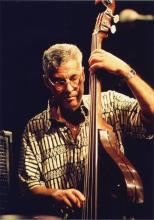The former Ethnomusicology Visiting artist (2005-2007) died in Miami on January 28, 2022.
By Shannon Dudley, UW Ethnomusicology
Joe Santiago 1950-2022
Joe Santiago, el bajista con Timba, passed away in Miami on January 28th. The cause of death was cancer. Jose Santiago was born in Naranjito, Puerto Rico, and raised in the South Bronx, NY, where he learned music in public schools. He went on to become one of the most sought-after bass players in salsa and Latin jazz, playing and recording with influential Latin dance bands and musicians of the 1960s through the 1990s, including Machito, Mario Bauzá, Carlos “Patato” Valdés, Tito Puente, Eddie Palmieri, Celia Cruz, Joe Quijano, Willie Colón, Rubén Blades, Héctor Lavoe and La Sonora Ponceña, to name just a few.
In 2007 Joe Santiago was interviewed by Dr. Marisol Berríos-Miranda, ethnomusicologist and curator for the museum exhibit, American Sabor: Latinos and Latinas in U.S. Popular Music. In Joe’s memory I have shared some of the stories he told to Marisol in that interview, in a combination of Joe’s words and mine. You can read it here.
In junior high school, Joe’s first instrument was the viola, given to him to play in the string ensemble at PS 139 in the Bronx. He became friends with another boy who played trumpet, though, and was inspired to play trumpet himself. After shining shoes and delivering groceries for weeks to save money, Joe bought his own trumpet. He and the boy, whose name was Willie Colón, started their own group and by the time they were in High School both of them were playing trombone. Their band gigged at community centers and at local dance halls such as the Hunts Point Palace, where they opened for headliners like Tito Puente and Eddie Palmieri. Joe played trombone on Willie Colón’s first two albums, El Malo and The Hustler, before joining the navy in the late 1960s.
Upon leaving the military in 1971, Joe turned his attention to learning the bass, the instrument for which he became famous. He began to gig with top bands, including Machito and Tito Puente. During the same time he used the GI Bill to do correspondence courses in music at the Manhattan School of Music, SUNY and Berklee College of Music. By the mid-1970s he was one of the most sought-after bass players in the burgeoning salsa scene, playing with Larry Harlow, Ismael Miranda and others in New York, and with la Sonora Ponceña in Puerto Rico. He had a special musical relationship with Cuban conguero Carlos “Patato” Valdez, and he earned the nickname “Timba”—a reference to the deep groove he kept, like a drummer. During the 1990s and early 2000s, at the peak of his craft, Joe anchored Eddie Palmieri’s band for over a decade.
From 2005 to 2007, Joe served as a visiting artist in Ethnomusicology at the University of Washington, Seattle. During that time he played with and mentored many musicians in Seattle’s Latin music scene, several of whom recently posted tributes to Joe on Facebook. Here are some excerpts.
Doug Beavers, trombonist and arranger:
You took me under your wing and gave me a deeper understanding about this music. The swing, the funk, what makes it tick. The difference between the real deal and the ‘gallego.’
Christian Pepin, percussionist (and grandson of percussionist Papo Pepin):
This man literally was forced in a way, lol, to help me, mold me and guide me to becoming a better musician, per my grandfather’s request. There is a reason why I truly love and adore bass players.
Julio Jaureguí, pianist:
I will never forget practicing piano in my basement and Joe bringing one of his out-of-this-world soups and saying "Maestro, you also have to eat..." It was very surreal. We talked from Mozart to Chucho Valdes, from religion to science. He taught me how to make Puerto Rican pasteles. We played, he taught me, we listened to music together and he gave me arranging books. He told me stories from Tito Puente, Patato Valdes, Ray Barretto. I cannot even begin to sum all the blessings I received from his knowledge and friendship.
Te queremos, Joe!
